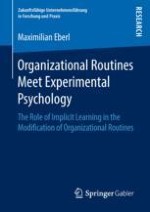Using an experimental approach, Maximilian Eberl evaluates the role of implicit learning (CBM/AAT) for the modification of organizational routines. Taking a vertical perspective on the (collective) entities in organizations shows an increasing role of impulsive processes the lower the level gets. The horizontal perspective demonstrates the potential of implicit learning for the replication of routines. Finally, the time perspective highlights the contributions of implicit learning strategies for change in and of routines, as well as the contributions of implicit learning to deal with the path-dependence of routines.
